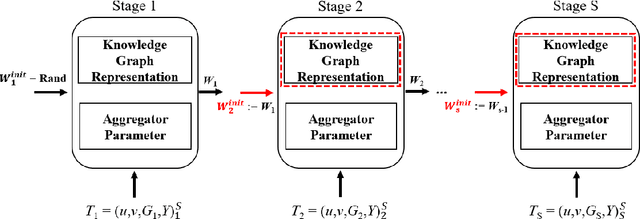GraphSW: a training protocol based on stage-wise training for GNN-based Recommender Model
Paper and Code
Aug 19, 2019



Recently, researchers utilize Knowledge Graph (KG) as side information in recommendation system to address cold start and sparsity issue and improve the recommendation performance. Existing KG-aware recommendation model use the feature of neighboring entities and structural information to update the embedding of currently located entity. Although the fruitful information is beneficial to the following task, the cost of exploring the entire graph is massive and impractical. In order to reduce the computational cost and maintain the pattern of extracting features, KG-aware recommendation model usually utilize fixed-size and random set of neighbors rather than complete information in KG. Nonetheless, there are two critical issues in these approaches: First of all, fixed-size and randomly selected neighbors restrict the view of graph. In addition, as the order of graph feature increases, the growth of parameter dimensionality of the model may lead the training process hard to converge. To solve the aforementioned limitations, we propose GraphSW, a strategy based on stage-wise training framework which would only access to a subset of the entities in KG in every stage. During the following stages, the learned embedding from previous stages is provided to the network in the next stage and the model can learn the information gradually from the KG. We apply stage-wise training on two SOTA recommendation models, RippleNet and Knowledge Graph Convolutional Networks (KGCN). Moreover, we evaluate the performance on six real world datasets, Last.FM 2011, Book-Crossing,movie, LFM-1b 2015, Amazon-book and Yelp 2018. The result of our experiments shows that proposed strategy can help both models to collect more information from the KG and improve the performance. Furthermore, it is observed that GraphSW can assist KGCN to converge effectively in high-order graph feature.
 Add to Chrome
Add to Chrome Add to Firefox
Add to Firefox Add to Edge
Add to Edge